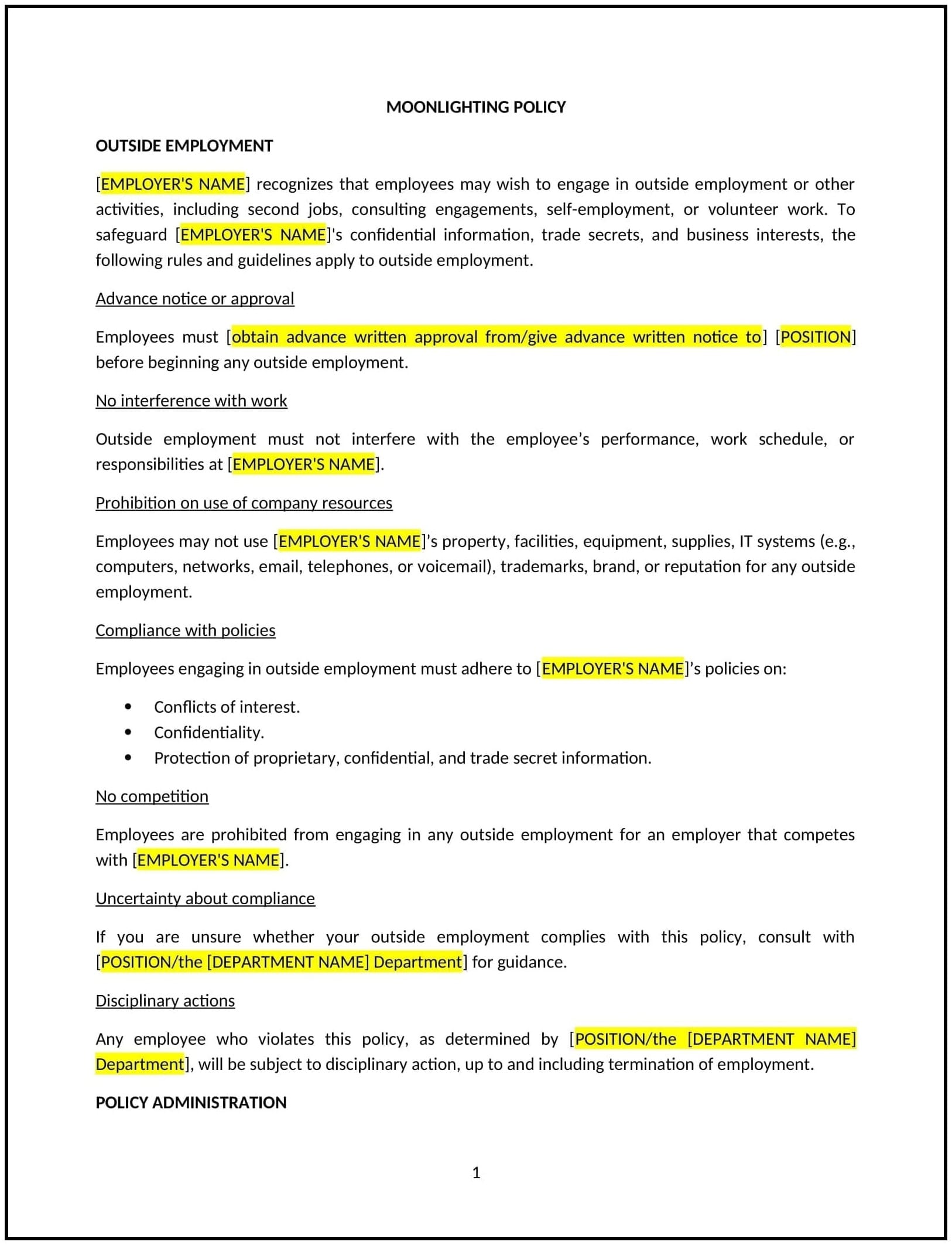Got contracts to review? While you're here for policies, let Cobrief make contract review effortless—start your free review now.

Customize this template for free
Moonlighting policy (Michigan)
A moonlighting policy outlines Michigan businesses' expectations for employees who take on additional employment outside of their primary job with the company. The policy clarifies the circumstances under which employees may engage in secondary employment, including restrictions on conflicts of interest, performance issues, and business operations. It helps businesses ensure that employees' outside work does not interfere with their responsibilities, job performance, or the company’s reputation.
By implementing this policy, businesses can maintain control over their workforce, avoid potential conflicts of interest, and support work-life balance while respecting employees’ rights to pursue secondary employment.
How to use this moonlighting policy (Michigan)
- Define secondary employment: Clearly define what constitutes moonlighting, including any outside employment, freelancing, or side businesses that employees may engage in while still employed by the business.
- Set clear boundaries: Specify the conditions under which employees may or may not engage in moonlighting, such as ensuring that outside work does not interfere with their performance, work hours, or availability during business hours.
- Address conflicts of interest: Prohibit secondary employment that could create a conflict of interest with the employee's primary role, such as working for a direct competitor or using company resources for outside work.
- Monitor performance: Ensure that moonlighting does not negatively affect an employee's job performance, attendance, or productivity. Businesses should clearly state that poor performance or frequent absences due to secondary employment may result in disciplinary actions.
- Require disclosure: Include a requirement for employees to disclose any secondary employment to HR or management, especially if the nature of the work could present a conflict of interest or impact job performance.
- Provide guidelines for approval: Outline the process employees must follow to seek approval for moonlighting, including submitting a written request with details about the outside employment and its potential impact on their primary job.
- Address confidentiality and company property: Remind employees that they are prohibited from using company time, resources, or intellectual property for outside work, and that any work-related information remains confidential.
- Review the policy regularly: Periodically review and update the moonlighting policy to reflect changing business needs, legal requirements, or shifts in employee work patterns.
Benefits of using this moonlighting policy (Michigan)
This policy provides several key benefits for Michigan businesses:
- Prevents conflicts of interest: By requiring employees to disclose secondary employment, businesses can avoid potential conflicts of interest and ensure employees’ loyalty and focus on their primary responsibilities.
- Protects productivity and performance: The policy helps maintain employee performance and productivity by ensuring that moonlighting does not interfere with the employee’s commitment to their primary job.
- Fosters a balanced work environment: Allowing employees to engage in secondary employment under certain conditions can support work-life balance and employee well-being, leading to higher job satisfaction and retention.
- Maintains company reputation: By setting clear guidelines, businesses can prevent employees from engaging in outside work that could damage the company's reputation or create ethical dilemmas.
- Reduces legal risks: A clear policy reduces the risk of legal issues by outlining expectations for employees’ outside work and preventing any violations of confidentiality or conflicts of interest.
Tips for using this moonlighting policy (Michigan)
- Communicate the policy: Ensure that employees are aware of the moonlighting policy by including it in the employee handbook, during onboarding, and through regular reminders or refresher training sessions.
- Encourage transparency: Create an open environment where employees feel comfortable discussing their outside employment, and emphasize that the policy is in place to protect both the employee and the business.
- Monitor performance: Regularly assess employee performance and address any concerns related to secondary employment. If there are signs that moonlighting is affecting job performance, address the issue promptly.
- Be consistent: Apply the policy consistently across all employees to ensure fairness and avoid potential claims of favoritism or discrimination.
- Review and update regularly: Periodically review the policy to ensure it aligns with the company’s needs, industry standards, and any updates to Michigan state laws or federal regulations.